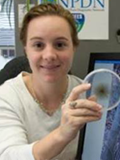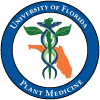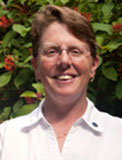Dr. Carrie Harmon

Featured in: DPM Newsletter Fall 2015
Dr. Carrie Harmon has been employed with the University of Florida since 2003 in her role as Associate Director of the regional project the Southern Plant Diagnostic Network (SPDN). In 2009, Dr. Harmon also became the Director of the Plant Diagnostic Center. Currently, Dr. Harmon serves as Associate-In Extension Scientist for UF. Her appointment is 80% extension and 20% research.
In the Plant Diagnostic Center, Dr. Harmon places priority on the extension clinic. Her daily duties include keeping track of samples from anywhere in the world, providing recommendations and identifications, checking in on research with graduate students, and organizing various trainings. Her passion for plant pathology and educating others lends itself to successful hands-on detection and ID workshops for extension agents and international groups as well as valuable lectures for graduate students. Each training oversees 9-12 people on average and occur three to four times per semester.
Additionally, Dr. Harmon facilitates two graduate-level courses and one professional internship in the PDC.





